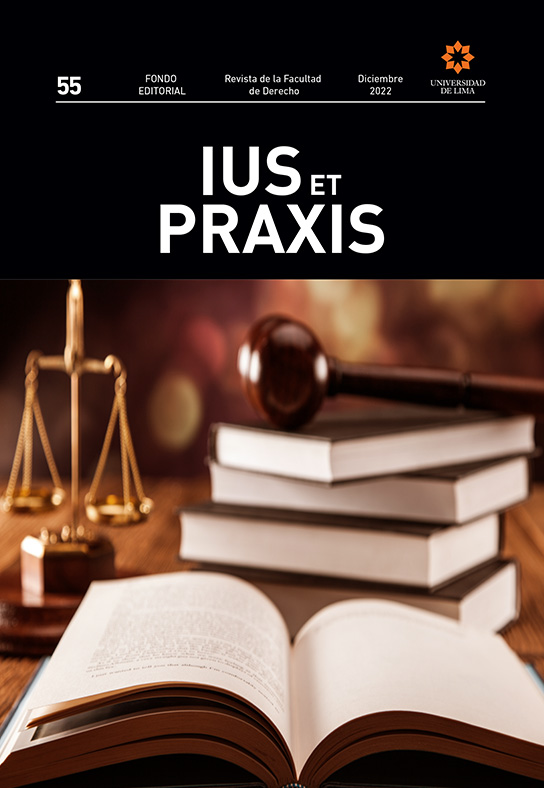Biases of unconstitutionality in the civil regulation of spouses’ freedom of work
DOI:
https://doi.org/10.26439/iusetpraxis2022.n055.6096Keywords:
freedom of work, equality of spouses, work outside the home, interest of the family, unconstitutionality, civil lawAbstract
The present work aims to make an exegetical study of article 293 of Civil Code, that regulates of spouses’ freedom of work. In the course of the work, is shown to exist biases of unconstitutionality in the above-mentioned precept because violates the freedom of work in marriage by requiring the express or tacit consent of the other spouse for work outside the home. However, given its validity within the legal system, I propose to interpret article 293 of Civil Code systematically with the articles 300 and 291 of the same Code until its unconstitutionality is formally declared or, failing that, until partially modified. The brief historical-legal analysis contained in this work, and which serves as a starting point, constitutes a fundamental guideline for understanding the presence of article 293 of the Civil Code in the regulations of our times.
Downloads
References
Amunátegui, C. (2006). El origen de los poderes del “Paterfamilias”: I. El “Paterfamilias” y la “Patria potestas”. Revista de Estudios Histórico-Jurídicos, (28), 37-143.
Código Civil del Perú. (1984). https://lpderecho.pe/codigo-civil-peruano-realmenteactualizado/
Código Civil de España. (1889).
Código Civil de Portugal. (1875).
Constitución Política. 1993 (Perú).
Convención Americana sobre Derechos Humanos. (1969). https://www.oas.org/dil/esp/tratados_b-32_convencion_americana_sobre_derechos_humanos.htm
Corte Interamericana de Derechos Humanos. (2007, 21 de noviembre). Caso Chaparro
Álvarez y Lapo Íñiguez versus Ecuador. https://www.corteidh.or.cr/docs/casos/articulos/seriec_170_esp.pdf
Díaz Giunta, R. (2021, 2 de septiembre). En defensa de la Constitución: No a la Constituyente. Pólemos. https://polemos.pe/en-defensa-de-la-constitucion-no-a-laconstituyente/
Expediente 02407-2019-PHC (Amazonas). (2021, 16 de febrero). Tribunal Constitucional: Pleno Jurisdiccional. https://www.tc.gob.pe/jurisprudencia/2021/02407-2019-HC.pdf
Expediente 02861-2010-PA (Lima). (2011, 9 de noviembre). Tribunal Constitucional: Pleno Jurisdiccional. https://www.tc.gob.pe/jurisprudencia/2011/02861-2010-AA.html
Expediente 02970- 2019-PHC (Madre de Dios). (2021, 23 de marzo). Tribunal Constitucional: Pleno Jurisdiccional. https://jurisprudencia.sedetc.gob.pe/sentencia/02970-2019-hc
Expediente 05829-2009-PA (Lima). (2010, 23 de septiembre). Tribunal Constitucional: Pleno Jurisdiccional. https://tc.gob.pe/jurisprudencia/2010/05829-2009-AA.pdf
Fernández Sessarego, C. (1992). Derecho a la identidad personal. Instituto Pacífico. Sentencia T-447/19. (2019). Corte Constitucional de Colombia.
Serna, M. L., & Kala, J. (2018). Derecho a la identidad personal como resultado del libre desarrollo de la personalidad. Ciencia Jurídica
Varsi, E. (2014). Tratado de derecho de las personas. Gaceta Jurídica; Universidad de Lima, Fondo Editorial.



